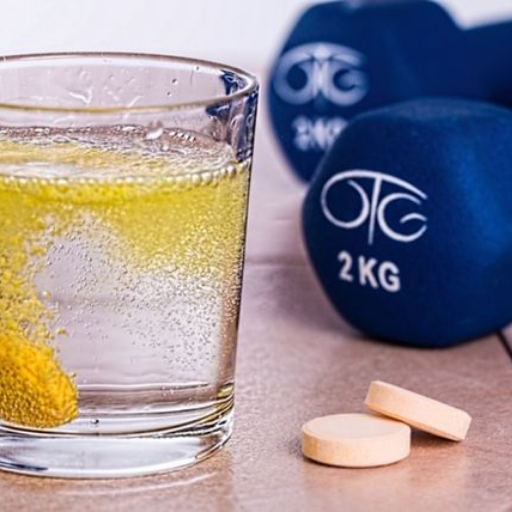7 supplements to boost your immune system
7 supplements to boost your immune system
Do you find yourself getting sick more frequently during the colder months? The common cold seems to become a lot more common during winter. Many people are prone to falling sick in the winter, and this is because many of the healthy habits that you maintain during the warmer months fall to the wayside.
The key to staying healthy during cold and flu season is to boost your immune system. To have a healthy immune system, the best thing you can do is live a healthy lifestyle.
Lifestyle factors such as lack of sleep, drinking too much alcohol, stress, an unhealthy diet or lack of exercise all contribute to weakened immune health.

How does the immune system work?
Every day you are exposed to a number of organisms that you either swallow or inhale. Depending on the strength of your immune system, the organisms you are in contact with can turn into disease or illness.
The immune system fights to remove and neutralise pathogens such as bacteria, parasites and fungi that could otherwise enter the body.
When your immune system is working properly, you probably don’t even notice its existence. It’s only when you’re struck down with some kind of illness that you realise the effects of a compromised immune system.
Factors that weaken the immune system
1) Stress
Chronic stress can take a significant toll on the body due to its impact on the cardiovascular system, nervous system and immune system function. Some of the signs of stress include irritability, loss of appetite or overeating, chest pains, difficulty falling asleep and fatigue and anxiety.
2) Lack of sleep
Adults need to get between 7-9 hours of sleep. Studies have shown that people who don’t get enough sleep are more likely to get sick if they’re exposed to a virus. The reason is that when you sleep, your immune system produces proteins called cytokines. Some types of cytokines are needed to fight off infections and inflammations. So if you’re not getting enough sleep, your body may be deprived of protective cytokines.
3) Lack of exercise
Whilst it’s unknown exactly how exercise increases your immunity response to certain illnesses, it’s believed that exercise improves your overall fitness, which ultimately strengthens your immune system and the body’s ability to fight infections. Exercise causes changes in the antibodies and white blood cells in your body, and white blood cells fight disease, so it’s believed this could help detect illness earlier.
How do you boost your immune system?

So how do you keep your immune system strong to prevent illness and disease? Let’s take a look at some of the supplements you can take to keep your immune system strong not just in the colder months, but all year round.
- Echinacea
Echinacea purpora extract is widely used to both treat and prevents infectious diseases because of its medicinal properties. Because of its antimicrobial properties, Echinacea fights against pathogens that could cause respiratory illnesses such as the flu, colds and sore throats. - Vitamin D3
A very common deficiency amongst adults is vitamin D. Known as the “sunshine” nutrient, a study by the Mayo Clinic found that 57% of adults are deficient in D3. Research shows that vitamin D deficiencies are associated with an increased risk of infection and autoimmunity, which is when the body attacks itself. During winter vitamin D deficiencies become more common as people generally get less sunshine on their skin. Winter is an especially important time of year to take vitamin D supplements. - Vitamin C
Vitamin C can also be known as ascorbic acid. It has many important functions in the body, such as helping the absorption of iron, wound healing, the immune system, formation of collagen and bones and teeth. Your body does not produce or store vitamin C, so regular intake is important. Vitamin C is one of the best immune boosters you can take! It has a wide range of benefits, including protecting the body against cardiovascular disease, immune system deficiencies, eye disease and even prenatal problems. - Zinc
Zinc helps heal wounds and fight infections. Some evidence has shown that taking zinc supplements during the first 24 hours of catching a cold can reduce the severity and duration of the cold. However, it’s still unknown the best dose, formulation and length of time to take it. - Vitamins B12 + B6
Because B vitamins are water-soluble, they can’t be stored in your body, which means that you need to consume them daily from your diet or from supplements. Your ability to absorb B12 decreases with age, and up to 10-30% of people have trouble absorbing B12 because they don’t produce enough stomach acid. B12 and B6 deficiencies have commonly been linked to depression and mood disturbances in the elderly. B6 supports essential biochemical reactions in the immune system. - Omega-3
The immune system is sometimes known interchangeably as the lymph system. This is because it’s made up of lymph node cells called lymphocytes, also known as T-cells and B-cells. The purpose of the lymph system is to destroy pathogens that cause infections and the lymphocytes go through the body seeking our viruses and bacteria. So how do Omega-3’s help? Omega 3’s boost the T-cells and B-cells, thus making them more robust in fighting against infections. - Probiotics
Probiotics are a very effective immune booster. Their function is far-reaching and impacts the dendritic cells, epithelial cells, T-cells, lymphocytes, and B-cells. Probiotics help to reinforce the barrier function of the intestinal lining, which lowers the chance of the bacteria in the intestine entering the bloodstream. There is a combination of lifestyle factors that ultimately affect the health of your immune system. When everything is working well, you won’t notice your immune system, but when it’s compromised, you’re likely to fall sick and can become susceptible to disease.
Keep your immune system strong this winter and all year round by focusing on living a healthy lifestyle and taking some of the amazing immune-boosting supplements we’ve talked about. Vitable can help you get started today.
Find out more about other areas that the above supplements can help you with:
Vitamin C | Vitamin D | Zinc | Vitamin B 12 | Omega-3 | Probiotics
*Always read the label. Follow the directions for use. If symptoms persist, talk to your health professional. Vitamin and/or mineral supplements should not replace a balanced diet.
